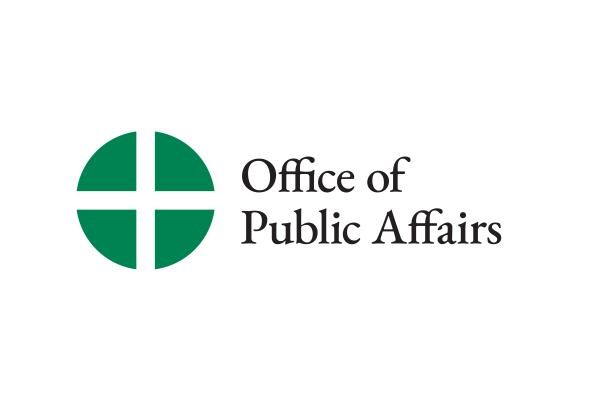Methodist-Catholic Dialogue Discusses Care for God's Creation
WASHINGTON—The U.S. Methodist-Catholic Dialogue launched a new five-year round of meetings, December 16-18, 2008, at St. Paul's College in Washington, discussing environmental stewardship. The dialogue, which had not met since 2005, brought together new delegations of scholars from the United Method
WASHINGTON—The U.S. Methodist-Catholic Dialogue launched a new five-year round of meetings, December 16-18, 2008, at St. Paul's College in Washington, discussing environmental stewardship. The dialogue, which had not met since 2005, brought together new delegations of scholars from the United Methodist Church (UMC) and the United States Conference of Catholic Bishops (USCCB).
The focus on the environment reflects the prominence of this topic among religious leaders across the world, said Bishop William Skylstad, Bishop of Spokane, Washington, and Catholic co-chair of the dialogue. "Stewardship of our environment and ecumenism fit very well together as a project in which we can work together in solidarity and common responsibility," Bishop Skylstad said.
In recent years, top church leaders, including Pope Benedict XVI and Orthodox Ecumenical Patriarch Bartholomew I, called the "Green Patriarch" for his environmental activism, have placed care for the world's ecosystems at the center of the Church's social agenda. The ecumenical presence at scientific conferences that examine the effects of fossil fuel emissions, deforestation, and nuclear proliferation on the environment has now become a standard occurrence.
What is unique about the new Catholic-Methodist discussion is its examination of environmental responsibility from the perspective of Christian worship, particularly as found in the Eucharist, said Father James Massa, Executive Director of the Secretariat for Ecumenical and Interreligious Affairs of the USCCB. "The liturgical enactment of Jesus' atoning sacrifice on the cross requires the cultivation of soil—and by extension, a planet—that is healthy enough to yield the wheat that becomes the 'one loaf' consecrated at the Eucharist," Father Massa said. Methodists and Catholics find new perspectives on faithful stewardship of the environment by looking to the various meanings and liturgical forms of Eucharistic worship.
In attendance at only the first evening session, Father Paul McPartlan of The Catholic University of America provided an overview of Catholic-Methodist dialogue since the time of the Second Vatican Council. He also noted the World Methodist Council's adoption of the Lutheran-Catholic Joint Declaration on the Doctrine of Justification in Seoul, South Korea in 2006, as an historic breakthrough in the relationship. On the basis on this doctrinal convergence on what it means to be justified, i.e. "made righteous" in Christ, the two churches now pursue a discussion of "living justly" in relation to God's creation.
Additional presentations by Jesuit Father Drew Christiansen, Editor of AmericaMagazine, and Bruce Birch, Ph.D., Academic Dean of Wesley Theological Seminary in Washington, assessed developments in environmental ethics in their respective churches. They noted that Catholic theologians rely on the authoritative social teaching of the popes and of bishops' synods, and Methodists draw on the traditions of hymnody and preaching on "social holiness" that were initiated by John and Charles Wesley, the founders of the Methodist movement. Both sides also look to Eastern theology, particularly its emphasis on the cosmic dimensions of the liturgy, as a rich resource for reflecting on the environment. Dialogue participants also reviewed the mandate for Round 7 of the dialogue and set topics of presentations for the next session, slated for May in Washington.
Bishop Skylstad acknowledged the importance of laying the groundwork for the new series of meetings. "I picked up a strong sense of enthusiasm and eagerness to move ahead in searching out our future course as we discussed the core theme, 'the Eucharist and the environment,'" he said.
Each day of the meeting, participants celebrated the Eucharist alternately in the Catholic and Methodist traditions. Methodists presented themselves at Communion time to the Catholic celebrant by asking for a blessing, as a way of respecting Catholic discipline which permits reception of Communion at Mass by non-Catholic Christians only in exceptional circumstances. Catholic participants asked for a similar blessing at the Methodist Eucharist.
Catholic participants also included Msgr. Kevin W. Irwin, The Catholic University of America; John Hart, Ph.D., Boston University School of Theology; Connie Lascher, Ph.D., The John Paul II Institute for Theology and Environmental Studies; and Angela Russell Christman, Ph.D., Loyola College in Maryland.
Methodist members included Bishop Timothy Whitaker, UMC Regional Bishop of Florida and Methodist co-chair; Rev. Dr. W. Douglas Mills, staff; Edgar Colon-Emeric, Ph.D., Duke University School of Divinity; Karen Westerfield-Tucker, Ph.D., Boston University School of Theology; and Sondra Wheeler, Ph.D.,Wesley Theological Seminary.

